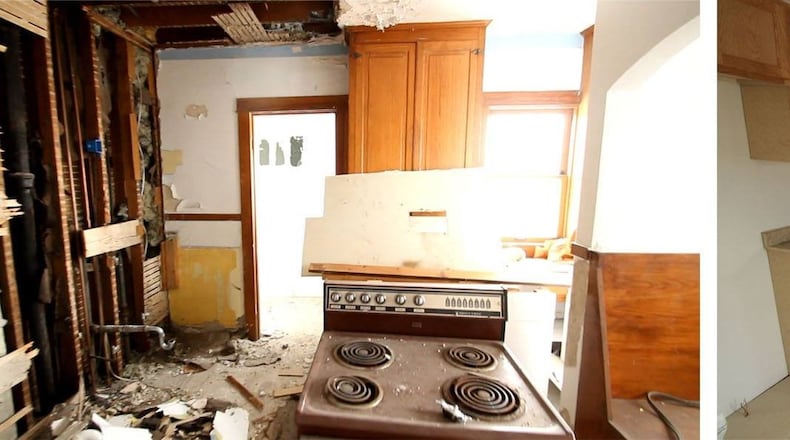Investors say the program makes it financially feasible to revive blighted properties that hurt local neighborhoods.
Wes Hartshorn, 37, has rehabbed and rented or sold about 20 properties in Dayton through the Lot Links program, also called REAP.
“My investment in Dayton certainly is because of REAP,” said Hartshorn. “If REAP was not there, I would have put my money in another city.”
RELATED: ‘Frustrating’ backlog in Dayton’s home fixer-upper program
But people looking make a quick buck should know that acquiring Lot Links properties take time, and many homes are uninhabitable and need a lot of elbow grease to change that.
Dayton’s Lot Links program allows people to acquire abandoned and tax-delinquent properties for relatively small costs (about $1,895 in 2015).
The program has changed dramatically since its inception a decade ago when people only could apply for vacant lots that were adjacent to their properties to turn into side yards.
The program was expanded to allow people to apply for properties across the city, including those that contain structures.
Last year, just 12.7 percent of applicants were seeking properties for a yard expansion, which was a 10-point decrease from 2016, according to data shared with Dayton city commissioners last month.
TRENDING: Dayton tops national list of cities where teachers, cops and others can most afford to live
Nearly 58 percent of applicants in 2017 were seeking to acquire properties to rent or sell, which was up from about 47 percent of program requests each of the previous two years, the data show.
About 30 percent of applicants were seeking properties to rehab to live in.
Rehabbing Lot Links properties to turn into rentals can be a decent way to make money, but also it can take more work than other kinds of real estate investment because of the poor condition of the homes, said Hartshorn.
Most properties require a great deal of renovations to make livable, said Hartshorn, who estimates that he’s pumped hundreds of thousands of dollars into his properties. He does most renovation work himself.
TRENDING: White Castle wedding: Kettering couple wins contest, gets married
“People would walk in and say, ‘Oh my god, what are you going to do with this?’” he said.
Hartshorn said he first used Lot Links about eight years ago and has finished rehabbing all but about two of the 20 properties he acquired, which are the only ones that are unoccupied.
Hartshorn converted most Lot Links properties into rentals, but sold a few to people he said were looking for a place to live but lacked access to traditional financing.
Hartshorn said he hopes other people who use the program aren’t only in it for the money, because profit-obsessed actors caused the housing crisis that led to many of these homes being abandoned.
Hartshorn, who lives in the Walnut Hills neighborhood, said most of his properties are nearby and he keeps an eye on them and makes sure they get his attention when needed.
RELATED: 1,000 and counting: Dayton’s home fixer-upper program grows
Lot Links wipes away the back taxes on abandoned properties, which tends to be the main reason they are so unattractive to buyers. Most commonly, people are seeking Lot Links properties to turn into rentals.
Ashlee Haselby is one such example.
Haselby acquired a single-family home at 2229 E. Fifth St. through the program, which is one of the four homes she is working to renovate in the Huffman neighborhood to rent out or possibly sell.
“They’ve been abandoned for 20-something years, so I am rebuilding them and bringing them back,” she told this newspaper earlier this year.
Haselby also is working to convert an old funeral home on East Third Street into an antiques marketplace and coffee shop.
RELATED: NEW DEVELOPMENT: Pizzeria, bar, coffee shop, antiques mall planned for east Dayton
Lot Links ran into problems last year when the city was only able to transfer 39 properties to Lot Links applicants. That was down from 185 transfers in 2016 and 145 in 2015.
The backlog is because of the Montgomery County Prosecutor’s office’s decision to stop handling the title research and other services for the city of Dayton, according to city documents.
For years, the prosecutor’s office did the abstract work for foreclosure filings for the city as a courtesy, but the workload became too burdensome, Mary Montgomery, chief of the prosecutor’s civil division, told this newspaper last year.
The city last year contracted with title research companies to handle the work and expected to transfer far more properties this year and moving forward.
About the Author

